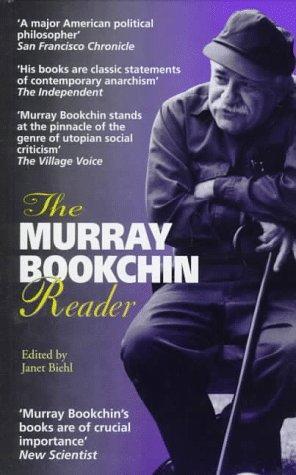sol2070 reviewed The Murray Bookchin Reader by Janet Biehl
Not the best introduction to Bookchin, but he is great
3 stars
(original em português → sol2070.in/2023/10/pos-anarquismo-murray-bookchin )
"The Murray Bookchin Reader" (1999; available free from the Anarchist Library) brings together articles written between the 1960s and 1990s by this immensely influential thinker and activist for the anarchist, ecological and "new left" movements in general. The collection attempts to summarize Bookchin's thinking.
One of the marks that Murray Bookchin (1921~2006) left was the revitalization, in the 1960s, of anarchism and decentralism as solid alternatives to capitalism, free from the traps of socialism. At the same time, he was also one of the pioneers in thinking of ecology as a fundamental element for change, foreseeing our ecological emergency.
It wasn't the most fluid reading. Some of the articles seemed dated and sometimes gave the impression of a patchwork quilt. In those moments, I wanted to read a book by him dedicated to a single theme, rather than a collection of brushstrokes on everything. I should have started with "The Next Revolution" (2015) or "The Ecology of Freedom" (1982).
I insisted on reading it because there are so few people like Bookchin, who fuses anarchism with ecology, offering a very practical model for change, pointing out the trap that is the default option when thinking about anti-capitalism (after decades of militancy, he abandoned socialism).
I disagree with him on some central points. But his rich contribution is undeniable.
In the 1990s, he also ended up abandoning anarchism. Or rather, perhaps he was abandoned, since a good proportion of "root anarchists" reject approaches such as direct democracy assemblies as being "too political". Since Bookchin didn't give up on mobilization and collective political engagement, he decided to abandon "official anarchism". On that point, I'm 100% with him.
One point on which I disagree is his passionate condemnation of deep ecology. He saw it as a kind of "mysticism" in relation to nature, and insisted that human beings are superior to other forms of life. He was obviously a convinced materialist.
I agree that the ecological movement getting mixed up with new age and self-help ideas - something very common today - is something that dilutes ecology to the point where the movement becomes innocuous. Not only is there no more confrontation with the destructive systems, but this can even strengthen them in the end.
But Bookchin's vigorous denial of transcendent principles in the "bigger nature" seems a bit over the top to me. No "mysticism" is required here, just as recognizing the "equality" between humans and other forms of life doesn't involve any irrationality either.
He also spares no criticism of what he calls "lifestyle anarchism", in which the individual aspects of freedom and expression are emphasized, rather than (self-)organization in solidarity. This uncomfortable characteristic has existed in anarchism since its beginnings, making the movement in many ways more like a brother to liberalism than to socialism.
In recent decades, this has gained strength, for example, among anarcho-primitivists. Now, there are even millionaires who declare themselves anarcho-capitalists ("Anarchy for the rich to do whatever they want. Government austerity for the poor.")...
Bookchin used a lot of his energy to denounce co-optations like these which, according to him, undermine anarchism, the ecological movement and the left in general from within.
Indeed. For example, I always remember that, on several historical occasions, it wasn't the capitalist system that crushed anarchists (including executions), but the socialist parties.

